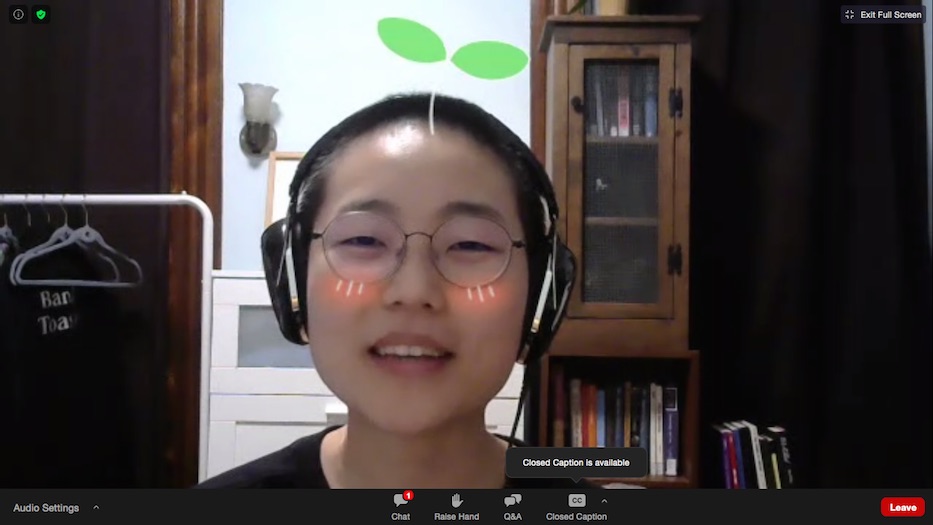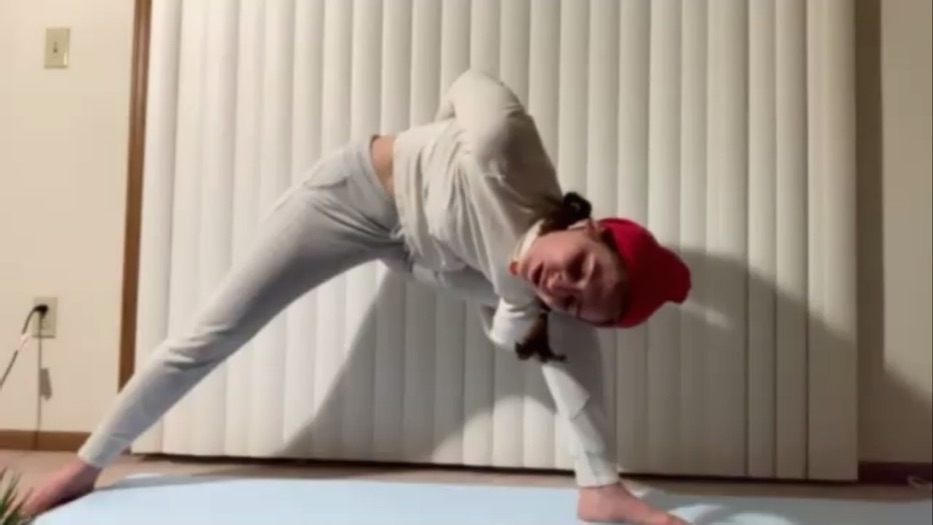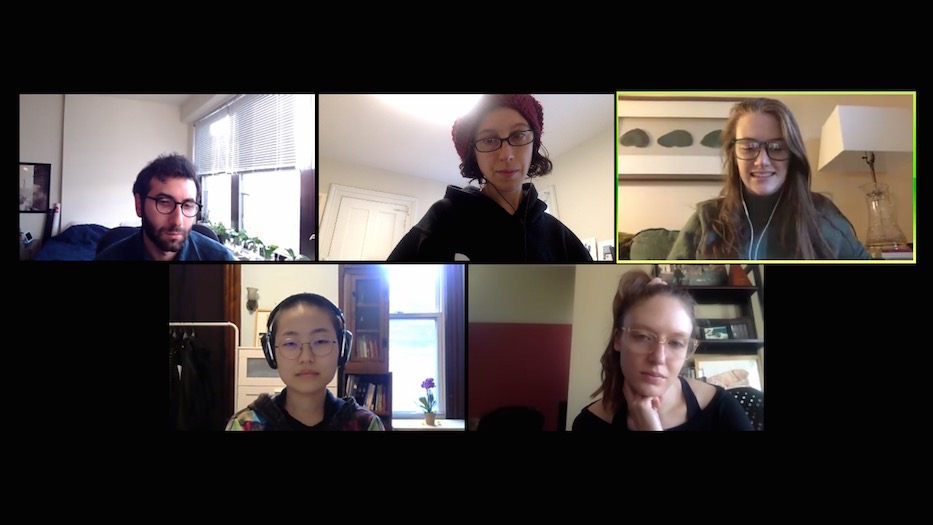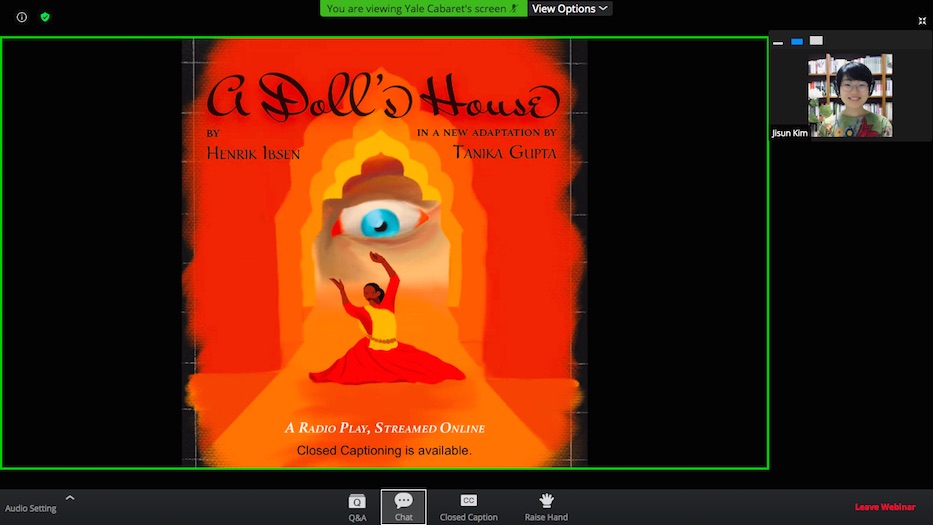
Arts & Culture | Theater | Yale Cabaret | COVID-19

A scene from Samantha Wolf's Ambient Dreams for Sleep Deprived Teens. Screenshot from Zoom.
A Marxist yoga teacher looked straight into the camera, watching a computer that sat somewhere at the end of her faded blue mat. She centered herself, spine lengthening as she breathed in and then out. A red headscarf covered her hair, a shock of color in a room of whites and tans.
“My intentions include killing the Bourgeoise both internally and externally,” she said right into the camera. She paused, giving the audience time to catch the laugh line. Then she moved into the next pose.
Ambient Dreams for Sleep-Deprived Teens is one of the ways the Yale Cabaret is embracing experimentation, online performance, and the permission to fail—or fly—in a 53rd season that has gone entirely virtual. This month, the theater is rolling out a gallery and second “Cab Potluck” among radio plays, multimedia performances, and pre-taped interviews that exist online. After a long break between Thanksgiving and February, it will return with a spring season.
It follows an online pivot from the Cab 52 team earlier this year, followed by a sizzling, short summer season of plays by Black women performed entirely over Zoom.
“We’re just trying to create a space that allows the [creative] teams to just try something,” said Managing Director Matthew Sonnenfeld in a recent Zoom call with the creative team. “Our audience has been extremely accommodating, forgiving, but also really supportive. The feedback that I get when I talk to audience members ... is that they’re so happy that we’re here. When COVID hit, other theaters were trying to fit a square peg through a round hole, and we had an opportunity to make a round peg.”

Clockwise, from top: Matthew Sonnenfeld, this reporter, Nicole Lang, Maeli Gorin and Jisun Kim.
Originally, the season’s creative team designed this year’s lineup with the Cab’s Park Street black box in mind. In the spring, team members noted, no one knew how long COVID-19 closures would last; there was still optimism around the possibility of in-person classes and shows that could resume in later months of this year. Then it became clear that the Yale School of Drama (YSD) would remain online in the fall.
The team looked to its collaborators—directors, actors, writers and recent grads across the university—and started thinking about what the season would look like online. It pivoted to a membership model, similar to what Long Wharf Theatre announced earlier this year. It lowered ticket prices, which have been higher than $35 for non-Yale affiliated attendees in the past. Along the way, its attachment to an institution with a $30 billion endowment gave it more financial stability than statewide theaters that have issued mass layoffs this year.
“We were proposing a season that would explore different models of what it means to make theater in an environment that was mutually fulfilling for all collaborators,” said Maeli Goren, co-artistic director at the Cab and a third year directing student at YSD. “The challenge of how you create a mutually fulfilling environment—that challenge is enormous, but it isn’t a challenge that doesn’t exist in the in-person theater world.”
“We realized that one of our central questions had to be about live-ness,” chimed in co-artistic director Nicole Lang. “The audience feeling the artists.”
So, she said, the team plowed ahead when thinking about how it also existed online. Instead of imagining themselves as temporarily displaced, team members built out a website that presented the internet as their home base. They started working with their collaborators to imagine how live theater might look when the stage was in fact a screen, and everything from blocking to audio design was reliant on an internet connection.

In the hope of connecting with the greater New Haven community, they also named YSD students Madeleine Charne and Eliza Orleans as artistic associates in community collaboration. While Goren said the team is still working to connect with both schools and groups in the wider community, the Cab will be directing its second community spotlight to People Get Ready bookspace, after focusing its first on Black Students for Disarmament at Yale.
Their online trial has taken multiple forms, some of them more experimental than others. In September, the team opened with three days of new work, followed by Tanika Gupta’s radio adaptation of Henrik Ibsen’s A Doll’s House. Set in late nineteenth century Calcutta, Gupta’s A Doll’s House is a work that lends itself particularly well to a radio play: a listener can imagine an entire world springing up before their screen (props to Evdoxia Ragkou and Bryn Scharenberg, who did sound design for the show).
For the Cab’s performance, a cast and crew put together a program with dramaturgical notes, and set and costume design, as if the show had a three-dimensional life. They watched as audience members logged on not just from New Haven and the U.S., but from across the globe. For two hours, hundreds of people sat around the orange glow of their computer screens, listening as actors brought Gupta’s retelling of an old story to life.
Since, performances have ranged from how to recreate a sensory experience without a shared physical space (Jimmy Stubbs’ The Untitled Bathtub Theater Project) to multi-part, multimedia ekphrastic theater (Lily Haje and Madeline Pages’ Love Songs). Goren recalled a moment early in the season, when technology quit on the artistic team just as a performance was supposed to start. Other YSD students began filling the chat with words of encouragement. There was no virtual toe-tapping at the time it took to make a technological fix.
“The whole audience does this thing of holding in place,” she said. “Those failure moments are almost those where we feel like, now it’s live.”
“Some people are looking at what synchronicity does for an audience,” she later added. “Others have been looking at how you tap into the viscera, the visceral. How do you tap into the sensorial? How do you get the audience to be playing alongside the performer? All of the explorations we’ve done so far are playing with time as a unifier when space can’t be.”

A still from Ambient Dreams for Sleep Deprived Teens. Zoom Screenshot.
Last Friday and Saturday, School of Music student Samantha Wolf deftly tied pandemic politics, sketch comedy, and the hard limits of self-care in her Ambient Dreams. This month, the theater’s artistic team is working on expanding the Cab’s footprint with a new, multimedia virtual gallery and second community potluck scheduled around the end of the university’s fall semester.
In the gallery, viewers can experience asynchronous work—installations, uploaded visual artworks, and student films, for instance—in addition to performances that crop up on most weekends. Goren called it a kind of pendant to the cabaret potluck series, which is meant to bring audiences into a kitchen—and around a table—while the cab’s physical kitchen remains dark. Chef Dana Cesnik Doyle, who runs Queen of Tarts Catering, hasn’t stepped foot in the Cab’s Park Street kitchen since March.
“I think looking forward to the next shows, I’m excited to investigate how we create community around this work,” Goren said. “We have a long period of dark time … we’re thinking about how we really intentionally curate the spring season. In the YSD artistic community, it’s a really hard space to make art. There are like ebbs and flows, but the drive to create is still there.”
Learn more about the second Cab Potluck, scheduled for Nov. 21 at 8 p.m., here.

